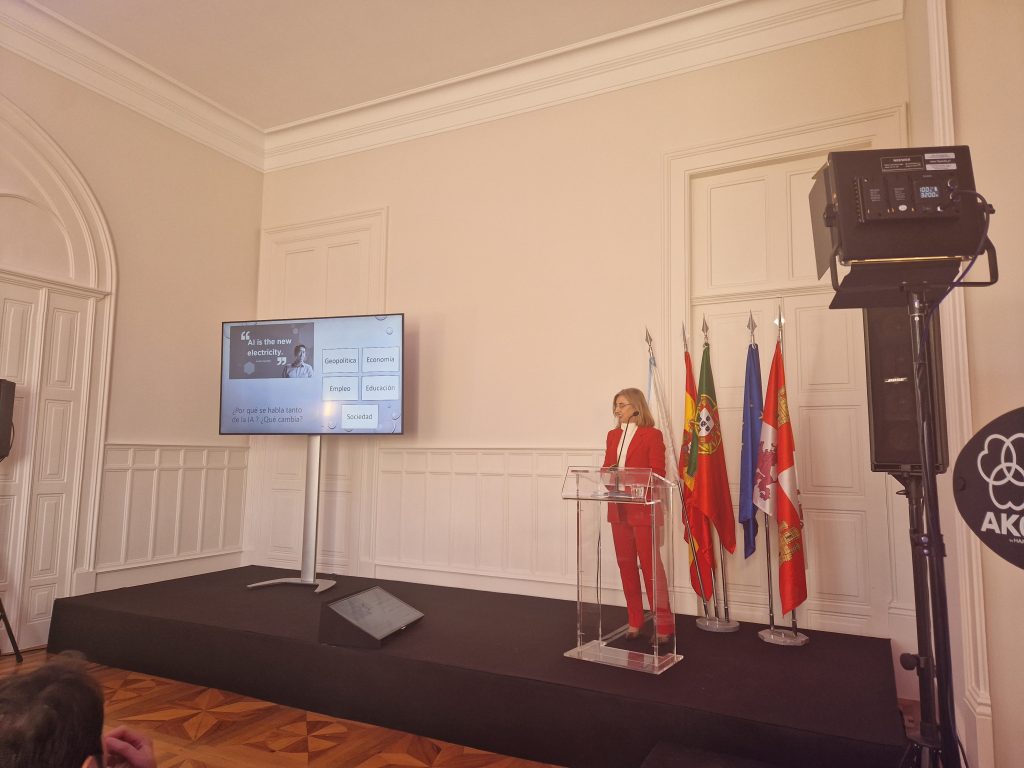
UDC's CITIC Utilizes Artificial Intelligence to Enhance Prediction and Response to Major Cross-Border Emergencies
- Thanks to the ATEMPO project, presented this morning in Oporto, involving public institutions and research centres from Galicia, Portugal, and Castilla y León.
- The presentation featured a lecture by CITIC researcher Amparo Alonso on the “potential applications of AI in emergencies.”
- The aim of the program is to explore the application of AI and technological innovations in the early response to fires or floods. This includes data analysis using deep learning techniques, advanced predictive models to support decision-making, and resource allocation.
- The technological development based on AI in the project, scheduled until 2025, is coordinated by CITIC’s scientific director, Manuel G. Penedo, from the UDC.
The main objective of the ATEMPO project, unveiled today in Porto, is to leverage the advantages of artificial intelligence and other technological innovations in significant cross-border emergencies. Framed within the POCTEP 2021-2027 Transnational Emergency Assistance program, it is driven by various public institutions and research centres from Galicia, Portugal, and Castilla y León. In Galicia, the Galician Agency for Emergencies (AXEGA) is responsible for outlining the major lines of action, while CITIC at UDC, under the coordination of its director Manuel G. Penedo, undertakes the AI-based technological development of this project. Researchers from the Industrial Campus of Ferrol are also involved.
Following a meeting of the project’s management and coordination committee, the ATEMPO presentation took place this morning in the Portuguese city of Porto, attended by various Portuguese-Spanish authorities. Among them were notable figures such as the vice president of CCDRN, Beraldino Pinto, and the manager of AXEGA, Marcos Araújo. During the event, CITIC researcher Amparo Alonso delivered a lecture on “the possibilities of AI application in emergencies.” Alonso emphasized the role of AI as a tool to address emergency situations, stating it is essential for anticipating, planning, and managing resources to tackle emergencies or conduct simulations. She also underscored the importance of cross-border cooperation in responding jointly to such situations. Additionally, she discussed the potential of AI for field knowledge, inter-administrative coordination, and communication, and meeting logistical needs.
On his part, the Vice-Rector for Scientific Policy, Research, and Transfer at UDC, Salvador Naya, expressed gratitude for involving the University in this project and emphasized the significance of cooperation between these territories (Galicia, Northern Portugal, and Castilla y León).
Proactive, rational, and intelligent response.
This is an ambitious collaborative program for emergency treatment and management, aiming to enhance response to major natural disasters such as fires or floods, which are primary consequences of climate change, through joint action by administrations and research centres.
The CITIC’s role in the ATEMPO project will focus on developing accident prediction systems using deep learning techniques. These systems will utilize databases from various partners as well as other sources such as meteorological services, economic activities in industrial areas, demographic data, and land use planning. Additionally, it involves creating AI-based data analysis algorithms, particularly predictive tools for emergency management and advanced prediction models to aid decision-making and resource allocation through sizing recommendation systems. These tasks will be conducted by research teams led by CITIC members Miguel Luaces and Elena Hernández Pereira.
For CITIC´s Director Manuel G. Penedo, this program represents “a significant step forward in demonstrating our centre’s ability to transfer knowledge to the real needs of society.” He added, “We are very pleased to contribute our expertise in AI to this project and collaborate closely with AXEGA of the Xunta de Galicia and other partners such as the Junta de Castilla y León, CIM Alto Minho, CCDR Norte, the Guarda Nacional Republicana, or the Instituto Nacional de Emergência Médica, among others.”
“It also means deepening our cooperation with AXEGA, which we have maintained since 2021, when we began meetings to assess the role of ICT in intelligent treatment and emergency management, based at that time on voice signals and fake news analysis,” says the CITIC director. “The challenge of extending this cross-border collaboration with other high-level partners is further evidence of institutional confidence in our competitive capacity,” he concludes.





